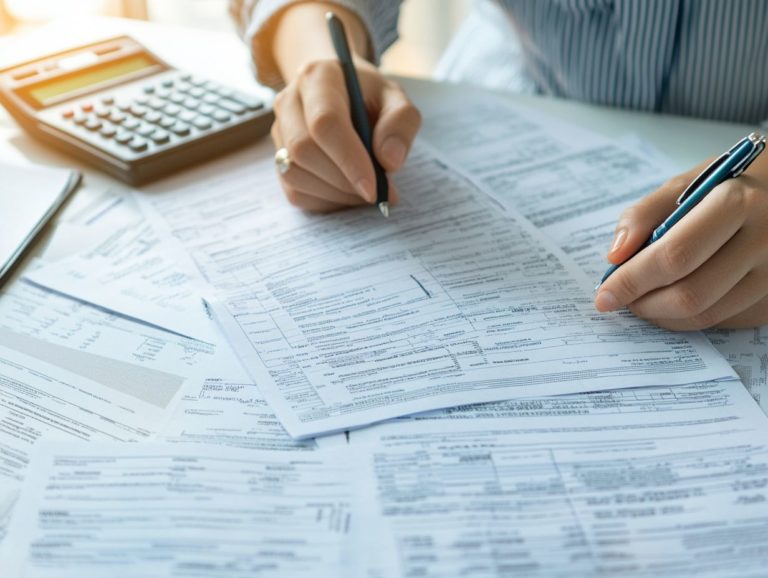Setting Aside Taxes: A Freelancer’s Essential Guide
Navigating the freelance landscape presents unique challenges. Understanding taxes is one of the most critical aspects. This guide outlines the various types of taxes freelancers encounter, their specific obligations, and the importance of setting aside funds to avoid penalties and maintain financial stability.
It also covers effective budgeting strategies, ways to maximize deductions, and tips for managing tax responsibilities.
Are you ready to take control of your financial future? Let’s get started on this essential journey!
Contents
- Key Takeaways:
- Understanding Taxes for Freelancers
- Why Setting Aside Taxes is Important
- Calculating and Budgeting for Taxes
- Effective Tax Planning Strategies
- Tips for Managing and Paying Taxes
- Frequently Asked Questions
- What is “Setting Aside Taxes: A Freelancer’s Essential Guide”?
- Why is it important for freelancers to set aside taxes?
- How much should a freelancer set aside for taxes?
- Can freelancers take off business expenses from their taxes?
- Are there any tax deadlines that freelancers should be aware of?
- What are some tips for staying organized and compliant with taxes as a freelancer?
Key Takeaways:
- Proper understanding of taxes is crucial for freelancers to avoid penalties and meet tax obligations.
- Setting aside taxes helps freelancers avoid financial instability and prepare for tax payments.
- Effective tax planning, such as maximizing deductions and creating a savings plan, can greatly benefit freelancers in managing and paying taxes.
Understanding Taxes for Freelancers
Understanding taxes is essential for complying with rules set by the Internal Revenue Service (IRS) and achieving financial stability as a self-employed worker. Freelancers have unique tax obligations, including self-employment tax, which complicates income reporting and tax return filing.
Tools like the Expensify app can be invaluable for tracking business expenses. Knowing applicable tax deductions and credits can significantly reduce your overall tax burden.
During tax season, thorough organization of financial documentation and accurate reporting of freelance income are crucial to avoid penalties.
Different Types of Taxes
Freelancers face various taxes that contribute to their overall burden. These include self-employment tax, income tax, and contributions such as Medicare and Social Security tax. Understanding these taxes is essential for effective financial management.
- Self-employment tax: This is the tax you pay as someone who works for themselves. It combines both the employee and employer’s shares of Social Security and Medicare tax, usually set at 15.3% of net earnings.
- Income tax: This tax is based on your total income. It consists of multiple brackets, with the amount owed increasing as income rises.
- Estimated tax payments: You may need to make estimated tax payments if you expect to owe $1,000 or more when filing your return, which applies when your freelance income exceeds $400.
- Tax forms: Proper preparation can streamline the entire process. Utilizing the correct forms—such as the Schedule C form that freelancers must file alongside their personal tax return—facilitates accurate reporting of profit or loss from business operations, business expenses, and the cost of goods sold.
Tax Obligations for Freelancers
Freelancers have specific tax requirements that they must follow to comply with IRS regulations. These include timely filing of tax returns and making estimated payments. Such obligations often stem from income reported on 1099-NEC (Nonemployee Compensation) forms.
It’s crucial to accurately report all income from clients while carefully managing expenses to maximize deductions and reduce tax liability. The typical process begins with calculating quarterly tax payments, which helps avoid surprises during tax season.
Since freelancers often experience variable income, quarterly payments allow them to break down the total amount owed into smaller, manageable payments, thereby avoiding underpayment penalties at tax time.
Freelancers must understand the implications of receiving a 1099-NEC form, which indicates earnings the IRS already recognizes. This means you are responsible for reporting that income.
Independent workers should stay informed about various forms and deadlines related to their work. Doing so not only helps them comply with the law but also enables better financial records that can support business growth.
Why Setting Aside Taxes is Important
Freelancers should set aside funds for taxes to ensure they can cover their tax bills. This practice protects against the risks associated with inadequate tax budgeting at the end of the year.
Setting aside funds helps avoid penalties, interest, and a significant tax bill that could jeopardize the profitability of their freelance business.
Avoiding Penalties and Interest
Freelancers can minimize their tax compliance risks by avoiding penalties and interest. The IRS often imposes harsh penalties during tax season on freelancers who fail to make accurate estimated tax payments throughout the year.
Not making the required estimated payments can lead to additional fines, such as the late payment penalty, which can accumulate quickly. Unpaid taxes can accrue interest, increasing the total cost of penalties.
To enhance compliance, freelancers should establish a system to track income and expenses, ideally using accounting software designed for small businesses.
Meet with a tax professional to stay compliant and save on taxes! Regular consultations can help ensure compliance and allow freelancers to take advantage of applicable deductions.
Maintaining a separate savings account for tax payments can improve money management and reduce the risk of an unexpected tax bill in April.
Ensuring Financial Stability
Financial stability for freelancers relies on effective budgeting for taxes and careful management of income and expenses. Understanding tax liabilities—the total amount owed in taxes—helps freelancers advance in their careers while maintaining financial stability.
Budgets should document all sources of income, provide realistic estimates for tax payments, and allocate a specific portion of income to cover these obligations for the year.
Many freelancers choose to safeguard their financial health by regularly depositing a percentage of their income into a separate savings account for tax payments or by adjusting estimated payments throughout the tax year.
Budgeting tools, such as Intuit’s QuickBooks for tracking invoices and payments, or apps like Mint for aggregating bank and credit card spending, help freelancers understand their spending habits and improve their cash flow management strategies.
The IRS website provides information on federal tax payment frequency, estimated quarterly payments, and current self-employment tax rates. Financial software, including QuickBooks, can help freelancers project income and expenses and estimate tax payments.
Some tools even allow freelancers to complete and file their taxes directly through the software. With the right tools in place, freelancers can ensure they have the financial resources to meet obligations and reinvest in their careers.
Calculating and Budgeting for Taxes
Calculating and budgeting for taxes is crucial for freelancers. Effective budgeting ensures that freelancers set aside enough money for taxes, which is essential for compliance and helps them avoid unexpected tax bills.
Act now to take charge of your finances and secure your freelancing future!
Factors to Consider
Freelancers need to calculate and budget for taxes based on their business structure, anticipated travel costs, and tax deductions that can help reduce their overall tax burden. Understanding these elements is crucial for accurately preparing income tax returns related to their freelance work.
Among the various unique tax issues freelancers face, the choice of business structure—such as sole proprietorship, LLC, or corporation—is the most critical. Each structure has different tax rates and liability implications, which affect how income is reported.
For instance, an LLC may offer higher allowable deductions for business-related expenses but also comes with a more complex filing process.
Travel expenses, including mileage, lodging, and airfare incurred for business purposes, constitute a significant portion of gross income that is not taxed. Freelancers can also improve their financial health by taking deductions for home office expenses, equipment purchases, and education-related costs.
Effectively managing these factors ensures compliance and helps create a robust tax-based financial plan for the coming year.
Tools and Resources for Calculating Taxes
Freelancers can leverage various tools and resources to calculate their taxes, including accounting software and apps like Expensify, which assist with expense tracking and tax preparation. Utilizing these tools simplifies the DIY tax filing process and enhances the accuracy of tax calculations.
Many digital solutions feature user-friendly interfaces and functionalities designed specifically for freelancers. They provide essential reminders for deadlines, reduce the likelihood of costly errors, and offer insights tailored to individual financial situations.
By organizing receipts and invoices efficiently, freelancers can save time and gain a clearer understanding of their finances, leading to more well-considered choices throughout the year. Staying organized helps freelancers keep up with changing tax laws, resulting in a less stressful tax season.
Effective Tax Planning Strategies
The most effective tax planning strategies for freelancers involve maximizing deductions and credits while ensuring financial stability.
By being aware of various tax credits available and implementing good record-keeping habits, freelancers can significantly reduce their tax liability.
Maximizing Deductions and Credits
Maximizing deductions and credits is crucial for freelancers seeking to reduce their taxable income. The most common deductions include the home office deduction and allowable travel expenses. Both can significantly impact total tax liability if specific requirements are met.
To qualify for the home office deduction, the office space must be used regularly and exclusively for business purposes. This allows freelancers to claim a portion of their rent, utility, and internet bills based on the ratio of the office size to the total size of their home.
Freelance workers should maintain detailed records of all travel expenses incurred during work-related trips, such as hotel and transportation costs. Keeping comprehensive records and receipts is essential to validate these deductions.
By utilizing appropriate bookkeeping systems and collaborating with a tax expert, freelancers can maximize their tax benefits while ensuring compliance with Internal Revenue Service (IRS) guidelines.
Creating a Tax Savings Plan
Establishing a tax savings plan is crucial for freelancers. It allows them to set aside funds for future tax payments without disrupting their business cash flow.
A clear budgeting plan helps freelancers project revenue and expenses. This way, they know how much to save each month for taxes.
Stay updated on changes in tax laws and rates. These changes can impact tax payments, whether they’re quarterly, bi-annually, or annually.
Regularly revisit income estimates to adjust savings plans. This ensures unexpected drops in revenue won’t jeopardize tax payments.
Using apps or software for expense tracking offers a clearer view of anticipated tax liabilities.
Tips for Managing and Paying Taxes
Freelancers can manage and pay taxes by knowing their obligations, organizing documentation, and choosing the right payment options. Proper preparation can make tax season less stressful and ensure compliance with IRS requirements.
Organizing Documents and Records
Organizing documents is vital for freelancers. It streamlines the tax filing process and ensures compliance with tax regulations.
Keeping financial records and using accounting software can simplify this task. A systematic approach saves time and reduces stress.
Use folders or digital solutions to categorize receipts, invoices, and bank statements. This enhances accessibility and accuracy.
Robust accounting software allows for automatic data entry. It helps freelancers prepare for tax season efficiently and stay compliant.
Utilizing Tax Payment Options
Freelancers must utilize various tax payment options to meet their obligations on time. Understanding IRS regulations and deadlines is crucial to avoid penalties.
Some available options include:
- Online Payments through the IRS Website: The IRS offers two easy payment methods:
- Direct Pay: Pay federal taxes directly from your bank account without fees.
- Debit or Credit Card: Use authorized third-party processors. Fees may apply, but payments are usually processed instantly.
- Installment Agreements: If you can’t pay in full, set up an installment agreement to spread payments over time. This can ease financial strain.
- Third-Party Payment Platforms: Some freelancers use these platforms to pay taxes from bank accounts, debit, or credit cards.
Stay informed about deadlines for each payment option. Keeping organized helps freelancers avoid last-minute scrambles and maintain good standing with the IRS.
Frequently Asked Questions
What is “Setting Aside Taxes: A Freelancer’s Essential Guide”?
“Setting Aside Taxes: A Freelancer’s Essential Guide” is a valuable resource for freelancers. It explains how to calculate and budget for taxes while offering tips for staying organized and compliant.
Why is it important for freelancers to set aside taxes?
Freelancers must pay their own taxes. Setting aside a portion of income for taxes is crucial to avoid a large tax bill or penalties.
How much should a freelancer set aside for taxes?
The amount freelancers should set aside for taxes varies by income and expenses. Consult a tax professional or use a tax calculator to find the right amount for you.
Can freelancers take off business expenses from their taxes?
Yes, freelancers can take off certain business expenses, such as office supplies, travel costs, and marketing expenses. It’s important to keep detailed records and only take off expenses that are necessary for your business.
Are there any tax deadlines that freelancers should be aware of?
Yes, freelancers are required to file and pay taxes by specific deadlines. The federal tax filing deadline is typically April 15th, but it may vary by state. Staying aware of these deadlines helps avoid late fees or penalties.
What are some tips for staying organized and compliant with taxes as a freelancer?
Taking control of your taxes is key to a successful freelance career! Here are some tips to stay organized and compliant:
- Keep clear records of your income and expenses.
- Set aside money for taxes.
- Consider using tax software or hiring a pro to simplify the process.
- Stay up-to-date on any changes to tax laws that may affect your business.










